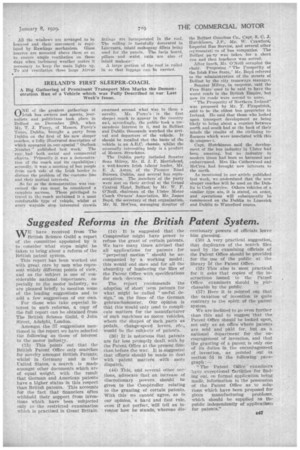Suggested Reforms in the British Patent System.
Page 33

If you've noticed an error in this article please click here to report it so we can fix it.
WE have received from The British Science Guild a report of the committee appointed by it to consider what steps might be taken to bring about a reform of the British patent system.
This report has been worked out with great care by men who represent widely different points of view, and as the Subject is one of considerable national importance, especially to the motor industry, we are pleased briefly to mention some of the leading suggestions and to add a few suggestions of our own.
For those who take especial interest in such reforms, a copy of the full report can be obtained from The British. Science Guild, 6 John Street, Adelphi, London.
Amongst the 57 suggestions mentioned in the report we have selected the following as those of interest to the motor industry.
(13) This points out that the British Patent Office only searches for novelty amongst British Patents, whilst in Germany and in the United States, a, search is made amongst other documents which are of equal weight, with the result that German and American patents have a higher status in this respect than British patents. This accounts for the fact that financiers often withhold their support from inventions which have been 'subjected only to the restricted examination which is practised in Great Britain; (14) It is suggested that the Comptroller might have power to refuse the grant of certain patents. We have many times advised , that all' applications for patents for "perpetual motion" should be accompanied by a working • model ; this would end once and for all the absurdity of lumbering the files of the Patent Office -with specifications for such devices.
The report recommends the adoption of short term patents:. for what might be called "useful design," on the lines at the German gebrauchsmuster. Our opinion is that this would only tend to complicate matters for the manufacturer of such machines as motor vehicles, where the shapeS. of -Such parts as pedals, change-speed levers, etc., would be the subjects' of patents.
(36). It is notorious that patents are far less promptly, dealt with by the Patent Office at the present time than before the war. It is .Suggested that -efforts should be made to deal with patent matters -withmore (44) This, and several other sections, advocate that an increase of discretionary • powers shOuld be given to the Comptroller relating to the granting of certain patents. With this we cannot agree, as in our opinion; a hard and fast rule, even if not perfect, Willtell an in_ ventor how he stands, whereas din
eretionary powers of officials leave him guessing: (50) A very practical suggestion, that duplicates of the search files used by the examining officials of the Patent Office should be provided for the use of the public at the library "Of the Patent Office.
(53) This also is most practical for it asks that copies of the instructions issued tothe Patent Office 'examiners should be pur
chasable by the public. •
(57) Here it is pointed out that the taxation of invention is, quite contrary to the spirit of the patent system.
• We are inclined to go even further than this and to suggest that the Patent Office should be looked upon, not only as An office Where Patents' are sold and paid for, but as a. national department for the encouragement Of invention, and that . the granting of a 'patent is only one of its duties in. the encouragement of invention, as pointed out iii section • 51 in the following para
graph •
• " The Patent OfZce examiners have exceptional' facilities for finding. our, on 'formal application being Made. information in the possession of the Patent Office 'as to Solutions which have been proposed for given manufacturing problems, which should be supplied to the public independently of applications for, patents."




































